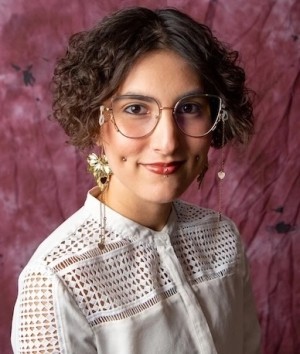A special guest post by 2025 Open Scholarship Intern, Riqué Duhamell Escobedo, on indigenous-led academic libraries, community-centered research approaches, and traditional knowledge sharing.

At Arizona State University, the Labriola National American Indian Data Center is a hub for Indigenous knowledge, offering resources, programming and community space that centers Native perspectives. As part of the ASU Library, the center supports Indigenous students and researchers by fostering respectful access to information grounded in sovereignty and cultural protocols. Academic libraries are increasingly reevaluating their roles in supporting community-centered research approaches. Though Labriola is the only one of its kind within the United States, other Indigenous libraries are also working to highlight the importance of this work. One leader in this space is across the continent: the Xwi7xwa Library at the University of British Columbia, which offers a powerful model for how libraries can promote Indigenous data sovereignty and research paradigms rooted in relationality and respect. Acting Head Librarian at Xwi7xwa Library, Kayla Lar-Son, gave the keynote presentation “Uplifting Indigenous Voices” during the 2025 OERizona Conference, which took place at the end of February.
Xwi7xwa Library, the only Indigenous branch of an academic library in Canada, is grounded in Indigenous ways of knowing. Its name, pronounced whee-wha, comes from the Squamish language and reflects the library’s commitment to centering Indigenous languages, stories and protocols in its collections and services. Unlike traditional cataloging systems that often impose colonial categories, Xwi7xwa organizes its materials using Indigenous classification systems, reflecting the perspectives and priorities of the communities it serves.
This approach aligns with broader movements around Indigenous data sovereignty, such as those supported by the Native Nations Institute at the University of Arizona. These movements advocate for Indigenous peoples' right to control how data related to their communities is collected, used and shared. Xwi7xwa puts these principles into practice by working collaboratively with Indigenous researchers and knowledge holders, honoring community-defined protocols around access and representation.
The library’s work is also informed by Indigenous research frameworks, such as “Two-Eyed Seeing”—a concept developed by Mi'kmaq Elder Albert Marshall — that encourages seeing through both Indigenous and Western knowledge systems. This integrative approach supports more holistic, ethical research and is foundational to frameworks like Indigenous Storywork, which values storytelling, relationships, and emotion as key elements of knowledge.
The keynote introduced scholarship like “A Digital Bundle: Protecting and Promoting Indigenous Knowledge Online,” which shows how these ideas translate into digital environments. Digital bundles are curated collections that reflect Indigenous community protocols, ensuring that cultural knowledge is shared with care and intention.
Publications and projects such as “Drumming Our Way Home” and “Reclaiming Spaces Between,” that translate lived Indigenous experience to pedagogy frameworks, and “Indigenous Storywork,” that emphasizes the importance of story as pedagogy, are being actively sought out, practiced, and shared thanks to the work of people with centers like Xwi7xwa and Labriola. These works center storytelling, land-based knowledge and community accountability as vital forms of scholarship, and they demonstrate how libraries can support Indigenous-led research that is both innovative and deeply grounded in tradition. These efforts remind us that equitable knowledge practices start with listening to stories, to communities and to the land.
